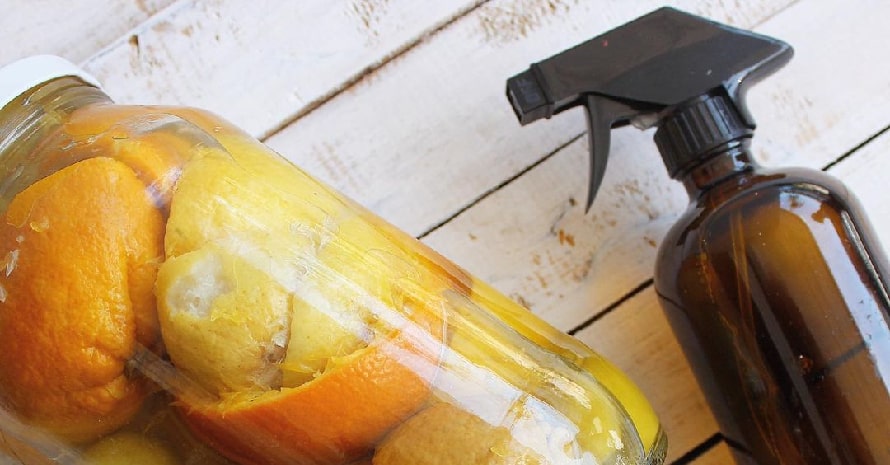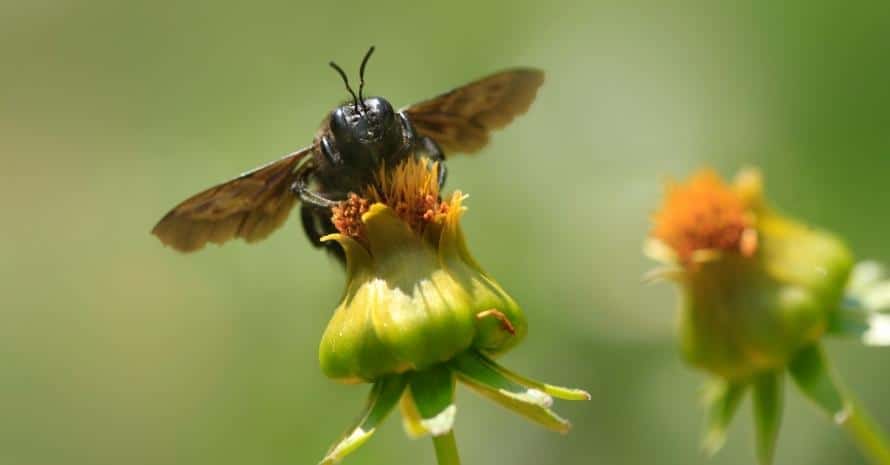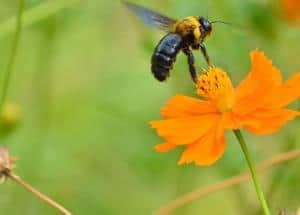Here’s my story over citrus spray for carpenter bees. Once returning from a family vacation, we noticed interesting “neighbors.” These were unusual dark-colored insects, similar either to large flies or to bumblebees.
They lived directly inside the canvas of our front door. There were several holes, which these insects periodically flew out and into. They’ve obviously set up there and had no plans to leave! I clearly recognized carpenter bees.
Such tenants can cause significant damage to new buildings and wooden surfaces. Moreover, their bites can be quite painful and dangerous, especially for those with allergies. What are these insects and how to deal with them? Here is the natural way to go — citrus spray for carpenter bees.
Guide on Citrus Carpenter Bee Repellent Spray
Carpenter bees can become a real nuisance for country house owners. They often build nests close to humans: in front doors, decking, porches, cornices, stair railings, garden furniture, wooden fence posts and so on. Every year they cause massive damage by tunneling wooden structures in various designs.
The insects could also be quite invasive. It is males who show the greatest aggressiveness, but they are not able to attack since they do not have a sting. Females, however, can sting, but only if seriously provoked. In particular, you shouldn’t swing your arms too much, catch bees or press them hard, it’s better to just ignore their buzzing and flying over your head.
The best defense against carpenter bees is, as in many cases, prevention. Wood such as pine, fir, cypress, oak, and mahogany, especially if the wood is not barked, stained, or treated, are the most common to be damaged.
You can suspect having such unusual neighbors by the following signs:
- even rounded holes with yellow spots in the wood;
- heaps of sawdust;
- “swarming” of bees around;
- insects enter their burrows or fly out of them.
So what shall you do with it? Further are given step-by-step instructions. Carpenter bee traps do not always work, and the solution must be environmentally friendly, humane and safe. This option is just what you need.
DIY Citrus Carpenter Bee Repellent
Why carpenter bees don’t like strong smells, and what smells do carpenter bees hate?

Insects do not tolerate strong and pungent odors, this is especially true for carpenter bees that feed on wood and have no need in odors as a guide to collect pollen.
Such smells are a signal of danger and, respectively, repel the bees. Garlic, cinnamon, almond, geranium, tomato, alcohol, gasoline, and vinegar work effectively. The most effective and safe, as practice shows, is a citrus oil spray for carpenter bees.
How to make and use it:
- First, let’s prepare everything necessary. We will need water and citrus fruits (lemon, orange, lime, grapefruit, tangerine, kumquat) and salt. Yes, your slice of lemon lying around in the fridge will do. You may as well use only one kind of fruit, but I prefer to mix. As you can see, the ingredients are very simple and natural. They can be found everywhere, and the remedy will not cause harm to others. The quantity is determined at our discretion or according to the possibilities. The more concentrated the remedy we prepare, the more effectively it will work.
- Citrus fruits should be washed in cold water and cut for convenience.
- Next, carefully squeeze the juice into a separate bowl. We will add it later to our spray.
- Now we should cut the peel and pulp, or rather its remains, as finely as possible (so the fruit will release more essential oils). Then put it all in a saucepan filled with cold salty water. You can also add a few cloves of garlic if you like.
- Bring the mixture to a boil, stirring constantly, and boil for 15 minutes.
- Remove the pot from the heat, cover with a lid and let it cool completely.
- In the meantime, add essential oils (optional) of citronella, geranium, lemongrass, and mint to the juice. Сitrus oil for carpenter bees is really a strong repellent, so it’s highly recommended to include them too. Here you can also use only 1 essential oil or a combination. Even a few drops are enough.
- When our broth has cooled, you need to strain it. This way it will be more convenient to spray the product during processing. Waste can then be composted and also used effectively as fertilizer.
- Mix juice with oils and broth. Pour it into a spray bottle. Voila! We are ready to fight uninvited guests in the garden.
Now let’s talk about the processing itself. You need to properly prepare for it. The most efficient time for processing is during the daytime since the carpenter bees are usually not in the nest during this period. Watch the nest. Pick up the moment when the insects flew out.

Thoroughly treat all wooden surfaces and the surrounding area, such as the lawn. While spraying, pay special attention to cracks in the wood sheet, if any. Carpenter bees look for cracks that will make their entrances less visible to woodpeckers, so they prefer to populate such wood.
Insects may return, so treatment should be carried out every year at least several times during the active season.
N.B. A little about safety.
- When preparing the spray, keep in mind that odors are quite strong, and if you cannot tolerate them, take care of good ventilation in the room. Do not use the product or any of its ingredients if you are allergic.
- The tool is safe and environmentally friendly, but make sure that it does not fall into the hands of children.
- In pets, the product may cause discomfort, although it is safe.
FAQ

Does orange oil repel carpenter bees?
Yes, it only repels but causes no harm. Any strong odors for these insects are an indicator of danger. Accordingly, bees avoid such places and objects for safety reasons.
What smell attracts carpenter bees?
Earthy, wooden smells and sweat. These are smells reminiscent of their natural habitat or food source. They signal that carpenter bees could feel comfortable here and attract insects.
Is orange oil safe for bees?
Yes, it isn’t harmful. Citrus oils do not cause discomfort or problems for bees because they are a natural component. Due to its pungent odor, the components of the spray only repel insects.
How to Safely Deal With Carpenter Bees
I shared the safe way to solve a problem that is quite relevant in the warm season. Insects often coexist with people in the modern world. Unfortunately, this is not always comfortable and leads to certain difficulties.
Our main task is to minimize the harm from such coexistence for both parties. Besides, the pleasant smell of citrus is not so bad, don’t you think? Would it be interesting for you to try such spray?
Also read:
- How to Get Rid of Bees
- How to Get Rid of Bumble Bees
- How to Get Rid of Ground Bees
- Carpenter Bee Trap Bait
- How to Keep Bees Away
- Bumble Bee vs Carpenter Bee
- How Do Carpenter Bee Traps Work
References:
- Carpenter Bees (United States Department of Agriculture)
https://www.fs.fed.us/wildflowers/pollinators/pollinator-of-the-month/carpenter_bees.shtml - Get Rid of Carpenter Bees? Yes, Please! (Museum of Comparative Zoology, Harvard University)
https://ecommons.cornell.edu/bitstream/handle/1813/43827/carpenter-bees-FS-NYSIPM.pdf?sequence=1 - Carpenter Bees (NC State University)
https://content.ces.ncsu.edu/carpenter-bees


